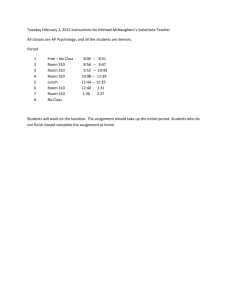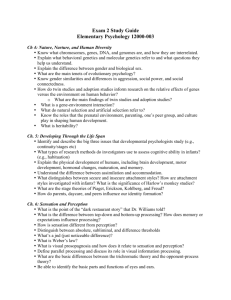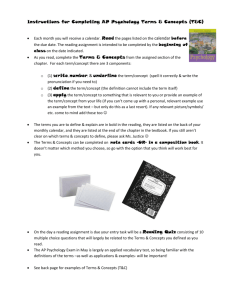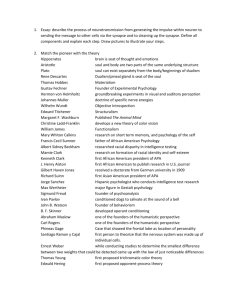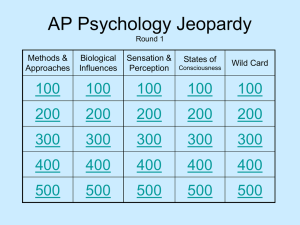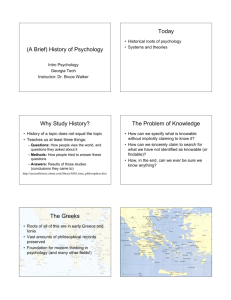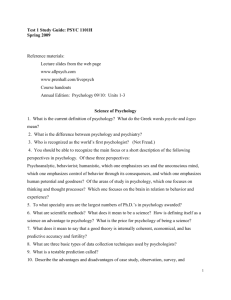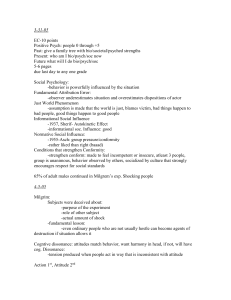2010 Psych Final Review Semester1
advertisement
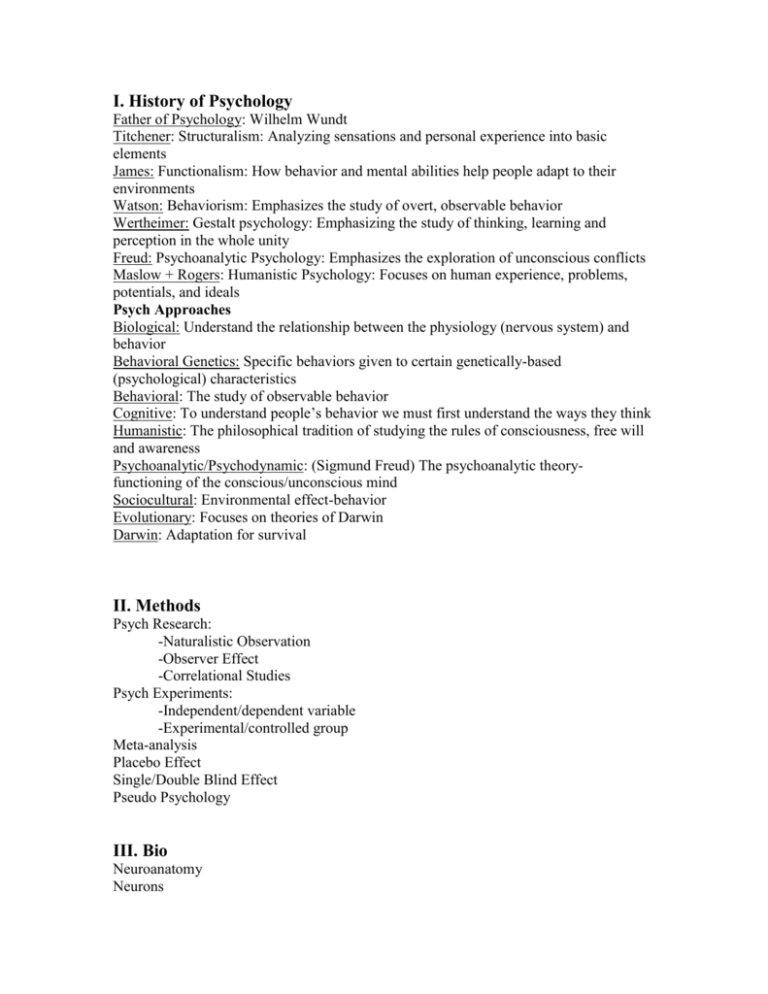
I. History of Psychology Father of Psychology: Wilhelm Wundt Titchener: Structuralism: Analyzing sensations and personal experience into basic elements James: Functionalism: How behavior and mental abilities help people adapt to their environments Watson: Behaviorism: Emphasizes the study of overt, observable behavior Wertheimer: Gestalt psychology: Emphasizing the study of thinking, learning and perception in the whole unity Freud: Psychoanalytic Psychology: Emphasizes the exploration of unconscious conflicts Maslow + Rogers: Humanistic Psychology: Focuses on human experience, problems, potentials, and ideals Psych Approaches Biological: Understand the relationship between the physiology (nervous system) and behavior Behavioral Genetics: Specific behaviors given to certain genetically-based (psychological) characteristics Behavioral: The study of observable behavior Cognitive: To understand people’s behavior we must first understand the ways they think Humanistic: The philosophical tradition of studying the rules of consciousness, free will and awareness Psychoanalytic/Psychodynamic: (Sigmund Freud) The psychoanalytic theoryfunctioning of the conscious/unconscious mind Sociocultural: Environmental effect-behavior Evolutionary: Focuses on theories of Darwin Darwin: Adaptation for survival II. Methods Psych Research: -Naturalistic Observation -Observer Effect -Correlational Studies Psych Experiments: -Independent/dependent variable -Experimental/controlled group Meta-analysis Placebo Effect Single/Double Blind Effect Pseudo Psychology III. Bio Neuroanatomy Neurons Neurotransmitters Synapse Branches of the Nervous System Reflex Arc Brain: -Hind brain -Mid brain -Fore brain -Cerebral Cortex -Hemispheres -Frontal Lobes -Parietal Lobes -Occipital Lobes -Temporal Lobes -Endocrine System IV. Sensation and Perception Data reduction systems Transducers Rods/Cones Phosphenes Sensory localization Just noticeable difference/Weber’s Law Perceptual defense Limen Subliminal Perception Anatomy of the Eye Visual Acuity Peripheral vision Bottom up/Top down processing Trichromatic and opponent process theory Color blindness/Ishihara Test Place theory/ Frequency theory Anatomy of ear Insomnia Pheromones Pain reception Small/large nerve fibers Depth perception Gestalt Principle Muscular cues Stereoscopic vision Retinal disparity Sensory Gates Selective/Divided Attention Habituation/Adaptation Somoesthetic Senses Kinesthetic Senses Vestibular Senses V. Consciousness Sleep -Sleep deprivation and effects -Brain waves and sleep (alpha, beta, thelta, delta) -Stages of sleep (REM/NREM) -Sleep Disturbances (nightmares/sleep apnea) -Chronic Insomnia (causes/cures) Dreaming -Calvin Hall -Freud’s Psychodynamic Dream Theory (dream symbols) -Hobson + McCarley- Activation Synthesis (paralysis, dreams with no psychological meaning) Drugs -Effects on the brain -Stimulants and depressants (alcohol, cocaine, ecstasy, marijuana, GHB…ect) -Hallucinogens -Barbiturates IX. Development Genetic Heritage + Environment= personality Parenting, Nurturing, Environment Development is affected by deprivation and enrichment Emotional bond with caregivers Language learning= key step in development Piagets stage theory-maps how thinking develops Vigotsky Theory-Childs mind is shaped by human relationships Effective child discipline= consistent, humane, encouraging, respectful Genetics research= predictions can be made Erik Erikson- Personality Theorist (8 stages) Problems of Childhood (Normal/Serious) Autism Child Abuse Abusive parents Adolescence, adulthood transition, puberty, early/late maturation The search for identity Moral Development
